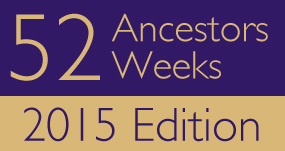This is week three of the 2015 #52 Ancestors in 52 Weeks Challenge where a group of u s blog about a different ancestor for each week of the year. To learn more about the 52 Ancestor Challenge visit Amy Johnson’s site at Amy’s website.
s blog about a different ancestor for each week of the year. To learn more about the 52 Ancestor Challenge visit Amy Johnson’s site at Amy’s website.
Born just before the eve of the American Revolution in Virginia, Elizabeth O. Brumley surely was quite educated for a woman of her time. Women of the gentry or well-to-do class acquired an education that included practical, literary, and ornamental skills. 1 Elizabeth instilled the importance of education into her children.
Her son, Oliver C. Vanlandingham, Sr.; ran a mercantile business while maintain a farm in Kentucky and eventually building a plantation in Louisiana. Her daughter, Elizabeth Vanlandingham, married Samuel Weir, a wealthy famer and brother to Oliver’s business partner, James Weir.
Elizabeth Brumley married Ezekiel Vanlandingham circa 1782. Ezekiel must have prospered well in Virginia, nonetheless, he sought new endeavors. Seeking rich farm lands and good hunting, the Vanlandingham’s set-off from Northumberland, VA to Muhlenberg County, Kentucky in the early 1790’s. Unfortunately, Ezekiel, died somewhere along the journey.
The options were to travel north to the Ohio River then follow the river down toward Kentucky. The Wilderness Road and Boone Trace led a pass through the Appalachian Mountains. A third longer route would be to sail around Florida to Louisiana and the Mississippi River north. My guess that the family traveled overland.
It is not known where or how Ezekiel died on this journey. He was young, having been born in June 1762 in VA. Oliver Vanlandingham recalled that he traveled to Kentucky as a young boy. Elizabeth Brumley made the decision to continue to Kentucky and not return to Virginia after her husband’s death.
Travelling to Kentucky at the turn of the 19th Century was treacherous. Pioneers who came over the Wilderness Road, endured severe hardships. The Wilderness Road was steep, rough, narrow, and it could only be traversed on foot or horseback. Because of the threat of Native American attacks, the road was so dangerous that most pioneers traveled well-armed. Robbers and criminals also could be found on the road, ready to pounce on weaker pioneers.2
Why was she so decisive in moving forward into the unknown? Why was it a better option then turning back to a more civilized and settled Virginia? She was indeed a strong, tough woman. That resilience continued when the family arrived in Muhlenberg County. Elizabeth bought her own land, farmed and reared her family there until her death in 1833.
Footnotes:
1) Women and Education in Eighteenth-Century Virginia by Linda Rowe, http://research.history.org/Historical_Research/Research_Themes/ThemeFamily/WomenEducation.cfm
2) Wilderness Road Wikipedia: http://en.wikipedia.org/wiki/Wilderness_Road

Recent Comments